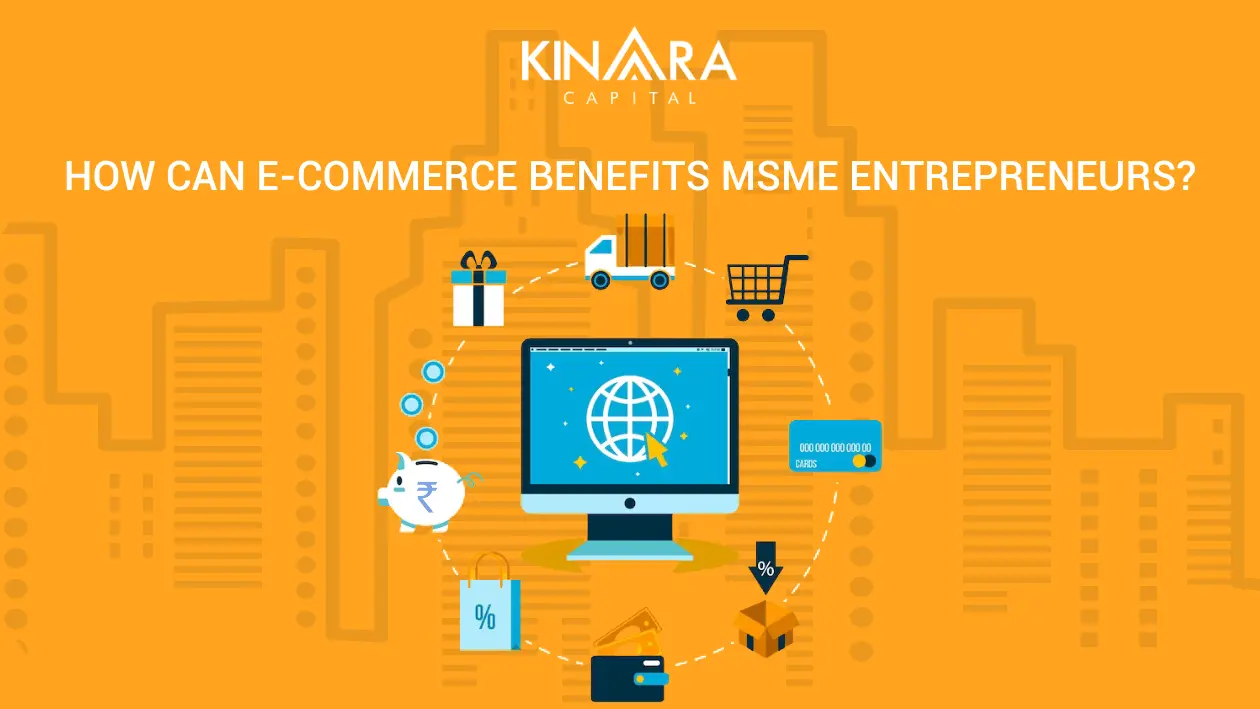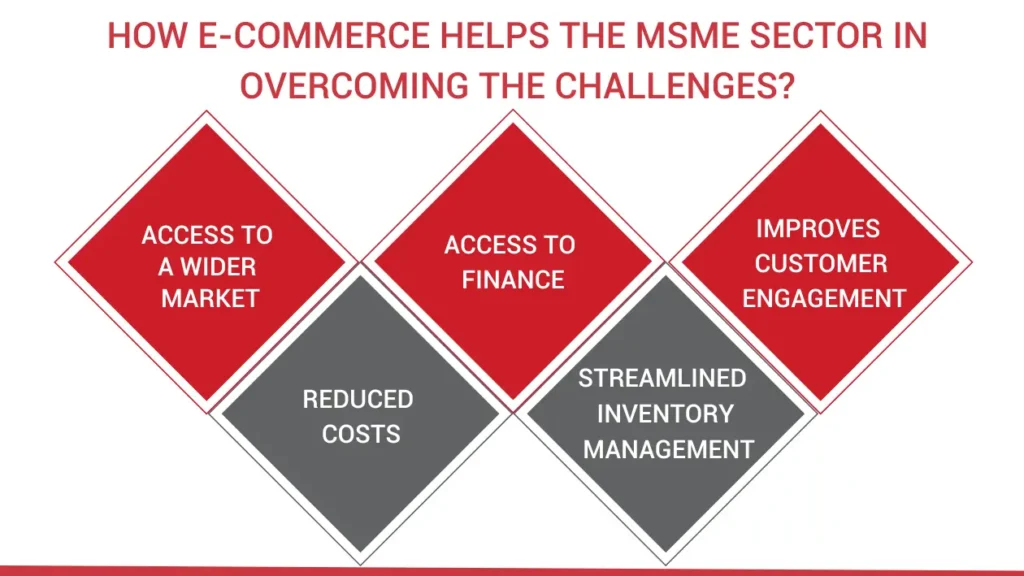
E-commerce or electronic commerce is the buying and selling of goods and services over the Internet. It is a broad term that encompasses a variety of activities, such as online shopping, online auctions, and online travel bookings. E-business has grown rapidly in recent years and is now a major part of the global economy. There are a number of factors that have contributed to the growth of e-commerce, including:
E-commerce has transformed how MSMEs operate. Over the past few decades, the sector has given tough competition to large industries and contributed remarkably towards the country’s industrial development. They are expanding not only in the domestic market but globally, too, with tremendous support from electronic commerce. E-business also helps MSMEs in restructuring businesses and opening up possibilities to earn a higher profit margin with optimum utilisation of resources.
The MSME sector has emerged as the fastest-growing segment in India. Their contribution to the overall GDP is around 30%. This sector comprises nearly 63 million enterprises that stimulate growth and contribute to the country’s socio-economic development by promoting entrepreneurship and providing employment opportunities to over 113 million people.
In recent years, the MSME sector has faced a number of challenges, but e-commerce has become a key tool for overcoming these challenges. This blog discusses the five most important ways in which e-commerce can help MSMEs in India.

One of the biggest challenges faced by the MSME sector is limited access to markets. Before, MSMEs used to sell their products only in and around their place of business. E-commerce platforms helped them find a new direction to market their products and services. It allows MSMEs to sell their products and services to a global audience, regardless of their location or size.
The expanded access provided by e-commerce platforms is a game-changer for MSMEs with smaller or niche audiences. These businesses can now reach and connect with customers who share specific interests or needs, overcoming the limitations of local economies and relying solely on word-of-mouth. The ability to tap into a global market brings unprecedented opportunities for growth and success for such MSMEs.
E-commerce platforms can also help MSMEs to reduce their costs. It eliminates the need for a physical storefront. This can save MSMEs a significant amount of money on rent, utilities, and labour. This can save MSMEs money on premises, maintenance, overheads, and staff costs. For example, an MSME that sells clothing online does not need to rent a retail space, pay for utilities, or hire staff to staff the store. This can save the MSME a significant amount of money, which can be used to invest in other areas of the business, such as marketing or product development.
E-commerce platforms can also help MSMEs overcome financial challenges. This was especially evident during the COVID-19 pandemic when many businesses were forced to close their physical stores. E-commerce platforms allowed these businesses to continue selling their products and services online, which helped them to survive the pandemic. In fact, many MSMEs that were able to quickly pivot to e-commerce actually saw an increase in sales during the pandemic.
E-commerce platforms also provide MSMEs with a platform to showcase their products to potential investors. It helps them secure business loans without collateral and other forms of financing. MSMEs looking for financial assistance in India can apply for business loans online from Kinara Capital, a leading last-mile lending firm. Kinara provides collateral-free loans to help small businesses take their business to the next level.
E-business can help businesses streamline inventory management by providing real-time visibility into inventory levels, automating order fulfilment, using data analytics to forecast demand, implementing JIT inventory management, using barcode scanning, and offering mobile apps. These features can help businesses improve accuracy, efficiency, and customer service.
E-commerce can improve customer engagement by personalising the shopping experience, connecting with customers on social media, offering live chat support, allowing customers to leave reviews, and offering rewards programs. By taking advantage of these strategies, businesses can build stronger relationships with their customers and improve their bottom line.
These platforms have been a boon for the MSME sector in India. It has helped MSMEs to overcome a number of challenges, such as limited access to markets, high costs, and difficulty in accessing finance. E-commerce has also helped MSMEs to improve their customer engagement and streamline their inventory management.
As e-business continues to grow, it is likely that MSMEs will continue to benefit from this technology. The Indian government has taken steps to promote the adoption of e-commerce by MSMEs. These initiatives include providing financial assistance, training, and marketing support. As a result, the number of MSMEs selling online is growing rapidly.
E-commerce platforms can help MSMEs to build brand awareness by giving them a platform to showcase their products and services to a large audience.
E-commerce platforms have helped MSMEs to generate leads in a number of ways. By providing tools to collect customer data, tracking customer interactions and automating marketing tasks, e-commerce platforms have made it easier for MSMEs to reach a wider audience and build relationships with customers. This has led to increased sales and revenue for MSMEs.
E-commerce platforms can help MSMEs to increase sales by providing them with a convenient and efficient way to sell their products and services to customers.
As the e-commerce market in India continues to grow, MSMEs that embrace e-commerce will be well-positioned to succeed.
E-commerce has provided MSME women entrepreneurs with a number of advantages that have helped them to overcome cultural and social challenges. These advantages include flexibility, accessibility, and reach.
It is a flexible business model that allows women entrepreneurs to work from home or anywhere else with an internet connection. This is especially beneficial for women who have caregiving responsibilities or live in areas with limited job opportunities.
It also allows women entrepreneurs to operate their businesses 24/7, even when they are not physically present. This gives women entrepreneurs more control over their work schedules and allows them to achieve a better work-life balance.
In India, women are often responsible for the majority of childcare and household duties. This can make it difficult for them to work outside the home, especially if they have to work traditional hours. E-commerce allows women to work from home, which can give them more flexibility to balance their work and personal lives. This can be especially helpful for women who are raising children or caring for elderly relatives.
In addition to flexibility, e-commerce platforms help women entrepreneurs to reach a wider audience. This means that women entrepreneurs can sell their products and services to customers all over the world. It can lead to increased sales and revenue without having to worry about building distribution networks or managing logistics. This can be especially helpful for women who are located in rural areas or who do not have access to traditional markets.
Kinara Capital offers business loans for MSME women entrepreneurs. They also get an automatic 1% discount on interest rates through HerVikas, a program specially designed for women MSME owners.
The MSME sector is a critical driver of economic growth in India. However, MSMEs face a number of challenges, including limited access to markets, high costs of procurement, and a lack of awareness of digital technologies. E-commerce can help MSMEs overcome these challenges and grow their businesses.
By selling their products and services online, MSMEs can reach a wider audience and expand their market reach. They can also reduce their costs of procurement by dealing directly with manufacturers and suppliers. Additionally, e-business can help MSMEs improve their customer service and provide a more convenient shopping experience for their customers.
MSMEs can acquire necessary financial support from non-banking financial companies (NBFCs). They can play an important role in helping MSMEs access the capital they need to expand their businesses. NBFCs like Kinara Capital offer various business loan products like Working Capital Loan and Asset Purchase Loan for the specific needs of MSMEs. Collateral-free loans are a valuable source of financing for MSMEs, especially those that are unable to obtain loans from traditional banks.
The power of e-commerce can help MSMEs overcome the challenges they face and grow their businesses into successful enterprises. However, the speed of online transactions and the volume of possible orders mean that MSMEs are even more likely to need financing on short notice when selling through these channels. Kinara Capital can provide the financing that MSMEs need to grow their businesses, even if they have limited collateral or credit history.
Kinara is a socially responsible fintech driving last-mile financial inclusion of small business entrepreneurs in India by providing fast and flexible collateral-free business loans. By combining the power of e-commerce with the financing support of Kinara Capital, MSMEs can overcome the challenges they face and achieve their business goals.
To apply for an online business loan without collateral, MSME entrepreneurs can take a 1-minute eligibility check in myKinara app. Kinara offers a quick and easy way for eligible businesses to get the funding they need. The entire application process, from start to finish, can be completed within 24-hours. Kinara also requires minimal documentation, making the process even simpler.
In addition to quick turnaround times and minimal documentation, Kinara also offers doorstep customer service to MSMEs. This means that a Kinara representative will come to MSME owners to help them with the application process or answer any questions they may have. Also, we have a dedicated customer support team available between Monday – Friday (9.30 AM – 6.00 PM) at our toll free number 1800-103-2683 for any questions or assistance. This ensures that entrepreneurs can get the help they need throughout the loan process.
Business loans are a credit facility that can help MSMEs grow their businesses. MSMEs often have difficulty accessing traditional forms of financing, such as bank loans. This is because they typically have limited collateral and credit history. Business loans can provide them with much-needed capital without any collateral or guarantee. They can also help MSMEs to improve their working capital, purchase new equipment, pay salaries, etc.
Kinara Capital offers unsecured business loans to registered MSMEs in the manufacturing sector with at least 1 year of operation and to MSMEs in the trading or services sectors with at least 2 years of operation.
Kinara Capital offers MSME loans to businesses in the trading, manufacturing, or services sectors. The businesses must meet the business loan eligibility criteria with a monthly turnover between Rs. 50,000 and Rs. 2 crores.
No, MSME owner’s don’t need to visit any branches. Kinara’s field officers will visit them at their place of business to provide information and help them with the loan application process. For any queries, MSMEs can contact Kinara’s in-house customer support team at 080-68264454.
A Working Capital Loan is a loan that is specifically designed to help businesses meet their day-to-day expenses. Working capital is the money that a business needs to operate on a day-to-day basis, such as for paying salaries, buying inventory, and covering other expenses. It can help businesses to cover their short-term expenses and avoid cash flow problems. This can free up the business to focus on its core operations and growth.
